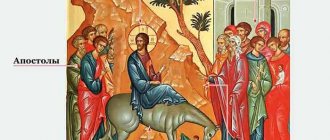According to legends, in time immemorial the Earth was shaken by grandiose battles - the Scandinavian gods overthrew ancient monsters, wielding thunder hammers and sparkling peruns.
Tribes lost in the impenetrable jungle watched aliens descending from spaceships.
And the ancient Greek women had to keep a vigilant eye on men and animals demanding their attention, because lustful Zeus could turn into a mortal.
Many miracles have been preserved in legends. And it is clear why this or that creature was revered: it is powerful and not like us.
But 2000 years ago a man was born on earth who led a bright but modest life. He died, and his memory was preserved in several dozen sources, most of which today are considered fake.
This man's name is Jesus Christ. So why does Christianity consider Him God? And isn’t God the Father the Almighty of our world? What kind of concept is God and man in one person? Let's be clear.
God the Father has many names, He created the world and is one step higher than everyone else in the Universe.
Let's start with God the Father. Orthodoxy calls Him Lord, God, but God seems to have no names. These are the consequences of the Synodal translation. In fact, we know from the Hebrew text what His name was approximately.
“Approximately” - because vowels were not used in those manuscripts, and no one knows how to correctly read the set of letters denoting God. The Old Testament Levites kept this secret too zealously. The original letters look like this:
Tetragrammaton - the secret name of God the Father in Hebrew
This inscription is called the Tetragrammaton. How did it read? There are two popular versions.
Version 1. Yahweh . The most common reading option. In the Orthodox version of the Bible, all places where God is called by name are changed. Instead of the name, “Lord” is written, which distorts the meaning of the original text and causes criticism from opponents of the Synodal translation.
Version 2. Jehovah. Using the same consonant sounds, you can get “Jehovah”. We have all heard this name in connection with the scandalous sect of Jehovah's Witnesses. But it is a mistake to associate him exclusively with her.
The word is ancient and sacred. However, Archbishop Theophan in his master's thesis came to the conclusion that Jehovah is still an erroneous reading. Yahweh's version is closer to how the prophet Moses addressed God.
God the Father is also called:
Adonai is a word that replaces the name of Yahweh, which could not be spoken in vain. Used for prayers. The Russian equivalent is “Lord.”
Hosts is a title, an addition to the name Yahweh. An approximate translation is “troops”, “armies”. That is, when we say “Lord of hosts,” we say “God of armies.” This is how we point to the power of God. The word is present in the Synodal translation.
“For the mouth of the priest shall keep knowledge, and the law shall be sought at his mouth, because he is the messenger of the Lord of hosts.”
(Mal. 2:7)
Elohim - means "God", but written in the masculine number (singular - "El"). This is a sign of respect. In much the same way, we address each other as you, although there is only one person in front of us. In the Synodal translation it is replaced by “God” and “Lord”.
Lord - akin to “lord” or “sovereign”, indicates a higher position over others. Mistakenly called by the name of God.
In fact, the Lord is also called, for example, Hindu gods: “Lord Shiva”, “Lord Krishna”, etc. So it's not a name, but rather a status.
In all cases we are talking about God the Father. Who is he? This is the one who throughout the Old Testament (and the New too) is called God. This is the demiurge, that is, the Creator, who created our world in seven days.
He is the source of everything, the supreme personality in the Christian, Judaic and even Muslim worldview. This is omitting other theological differences.
The position of God the Father stands out significantly in the world of ancient deities, since He is the One God, the symbol of a monotheistic religion. It is impossible to imagine another deity next to God the Father in most Christian branches.
God is a role that can only be played by one, the supreme being.
Others are a step lower. Or even more than one. Even God’s opponent is Satan, and he is not strong enough to provide sufficient opposition to the Lord.
It is unknown what God the Father looks like. The Bible says that He created man in His own image and likeness, which is why images of a gray-bearded old man are common. This is how He is in the Trinity icons.
God the Father is depicted as a gray-bearded old man
The Holy Spirit is the presence of God in the mortal world
Now let's talk about the Holy Spirit. The Russian language slightly distorts this concept. In our country, spirits are usually called ethereal entities like ghosts. Here the Spirit is the all-pervading energy. This is how we talk, for example, about the military spirit. But the Holy Spirit also has a personality, so it's not just a mood. This is a manifestation of God, His part.
In Christianity, the Holy Spirit is talked about ambiguously. And the Jews generally consider Him to be a quality or manifestation of God. But Orthodoxy believes that the Holy Spirit is the same God, the true one. His task is to enter the hearts of people, illuminate the earthly and make it spiritual, holy, filled with the Divine.
It is noteworthy that in Hebrew the Holy Spirit is feminine. Our translation does not convey this. The Gospel of John describes the appearance of the Holy Spirit:
“And John testified, saying, I saw the Spirit descending from heaven like a dove, and remaining on him.”
(E. 1:32)
We can observe this episode in the images dedicated to the baptism of Jesus.
At the baptism of Jesus, people saw two hypostases of God: Christ and the Holy Spirit
And in the Acts of the Holy Apostles, the Holy Spirit looks like tongues of flame:
“And cloven tongues as of fire appeared to them, and one rested on each of them. And they were all filled with the Holy Spirit, and began to speak in other tongues, as the Spirit gave them utterance.”
(DA 2:3)
Actually, it couldn’t be otherwise. The spirit does not have a permanent physical form.
Why Jesus is God - Indian Philosophy
The understanding of this world law, Logos, Tao, Word, was revealed not only to the Greeks, Jews and Chinese, but also to the Indians. Everywhere there were wise people who wanted to know the essence of existence. and in their reflections they reached the truth and touched it.
Due to causes , the world exists, due to causes, all things exist and all beings depend on causes and are limited by them. They are stable like a rotating cart wheel - with the core of its axle.
Buddhism. Sutta Nipata 654
There is a people in India called Sikhs. And there they came to understand the reason for things. Divine Law of Sikhism. The Divine Law manifests itself through everything, but cannot be expressed by itself. Everything is created by the Divine Law; the great is exalted by the Law. The Divine Law distinguishes between nobility and dishonor, By the Law all things are brought to bliss or misfortune,
In ancient Indian Vedic philosophy, Rita (the word itself is related to our word, speech, rhetoric, which reflects the understanding of the WORD as in the Bible) is the most important universal cosmic law, thanks to which the “ordering of the disorderly” occurs, the rotation of the Universe and the existence of all things, including Space, man, morality . Rita is the truth in the broadest sense of the word, even the gods and their deeds, the movement of the Sun, the weather on Earth and cosmic laws are nothing more than manifestations of Rita, invisible to mere mortal people (“The law is hidden by the law”). People know the laws of Rita, which speak of chastity and moral behavior. Friends, with these stories I would like to convey to you the feeling of world law, cosmic principle and order, which is huge, great and amazing. So that you think about how it happens that in different corners of the planet, people reach the same understanding.
Jesus Christ is considered a man, prophet, archangel, fiction and God
Jesus Christ is the central figure in the Bible. Even the Old Testament, which tells about events before the birth of the Savior, still focuses on His coming.
Many prophecies and instructions fuel the centuries-old expectation of the Jews. It is felt that the Messiah is about to come, who will change the world forever.
4
so many gospels are written about the life of Jesus
The New Testament does not say much about Jesus Christ on earth. Only four Gospels testify to His life. This gives rise to speculation and speculation.
And therefore the assessment of the personality of Christ is quite ambiguous. Orthodoxy sees in him the Son of God - another hypostasis of the Trinity, equal in power and significance to the others. But not everyone agrees with this. There are other interpretations of the events of the Gospel:
Statement one. Jesus was a man . During his earthly life, Jesus never once calls himself God in the text of the Bible. Jesus says
“I and the Father are one.”
(E.I. 10:30)
This, some researchers believe, may simply be a philosophical idea. Although the Apostle Thomas addressed Jesus “My Lord and my God!”, he does not comment on this phrase in any way, leaving it on the conscience of the disciple.
Christ refers to himself as the Son of God, but in a sense we are all children of God.
Statement two. Jesus was a prophet. Islam does not consider Christ as God, but considers Him one of the greatest prophets of Allah.
The Koran also denies the crucifixion of Jesus. In Islam, Jesus Christ is a particularly revered prophet, known as Isa ibn Maryam al-Masih.
Statement three. Jesus was the Archangel Michael. This idea is held by Jehovah's Witnesses, based on the verse
“For the Lord himself will descend from heaven with a call, with the voice of an archangel and with God’s trumpet.”
(Thess. 4:16)
Statement four. Jesus did not exist. This idea is based on the small number of written sources about the life of Christ. It is important to understand that at one time He was lost among other traveling preachers.
Historians didn't care about them. And yet there is a number of evidence (Josephus, Tacitus, apocrypha).
We will not argue with every statement now. In the next section we will present the Orthodox and most popular point of view in Christianity (and in the world).
Priest Afanasy Gumerov answers:
The author of the letter touches on the cornerstone truth of Orthodox theology: Jesus Christ is God. The question of the Divinity of the Savior in the history of the Church was central in the dispute with representatives of some heretical movements. The most difficult struggle took place in the 4th century with the Arians. The church body, with the help of God, coped with this dangerous disease. Orthodoxy was defended by the great defenders of the truth: Athanasius the Great, Spyridon of Trimifuntsky, Nicholas the Wonderworker, Hosea of Corduvia, Basil the Great, Gregory the Theologian, John Chrysostom and others. Now doubts come from representatives of some sects and Islam. This question is repeated regularly with depressing monotony. It's easy to tell where he's coming from by the wording and tone. You can paraphrase the proverb: “Ask me a question and I will tell you who you are.” At the root of doubt are fundamental errors of faith. One of the main ones is the inability to accommodate the doctrine of the Holy Trinity into a narrow and distorted religious consciousness. And then other misconceptions arise. The result is literalism. This error is especially dangerous because the false opinion is covered up by the authority of Holy Scripture. The essence of literalism is extremely simple: a person finds words and expressions that are beneficial to him and which, as it seems to him, “confirm” his views. A stable set of quotations has emerged, which can be called the golden fund of modern literalism: it is written “do not make images,” but you, Orthodox, make icons; It says don’t call anyone father, but in your church every second person is a father; it says “do not kill,” but you bless the soldiers and serve prayer services, etc. Literalism also manifests itself in the denial of the Divinity of Jesus. Several passages are used where Jesus calls the Father His God: “I have not yet ascended to My Father; But go to my brothers and say to them, “I am ascending to my Father and your Father, and to my God and your God” (John 29:17). Let's resolve the fundamental question: why does the Savior call the Father His God? Because He became incarnate and became a man: “he did not consider it robbery to be equal with God; But he made himself of no reputation, taking on the form of a servant, being made in the likeness of men, and becoming in appearance like a man” (Phil. 2:6-7). After the Incarnation, Jesus Christ has two natures and two wills. Having taken upon Himself the sins of all people, suffering for them to death, the Savior naturally calls the Father God, and Himself the Son of Man: “The Son of Man did not come [to] be served, but to serve and to give His soul as a ransom for many.” "(Matthew 20:28). God does not eat, but Jesus did eat (Matthew 11:19), God cannot die and rise again, but Jesus suffered on the Cross and rose from the grave. Here he acted according to his humanity. It is quite obvious that while Jesus was fulfilling this great Mission, He did not call Himself God, but the Father Who sent Him: “If God were your Father, you would love Me, because I proceeded from God and came; for I did not come of Myself, but He sent Me” (John 8:42).
Now let us pose another fundamental question: is there evidence in the New Testament that Jesus Christ is God? A bunch of! Let's start with the Gospel. When the Apostle Thomas believed in the resurrection of his Teacher, he said: “My Lord and God
my!"
(John 20:28). The Gospel of John begins: “In the beginning was the Word, and the Word was with God, and the Word was God
” (1:1).
In the text, the Word (Logos) is directly called God. In Greek: “Theos en o Logos.” The objection that is usually made to this point is very weak. They say: Theos is without an article and therefore, they say, it is not about a personal God. But in verse 6 of this chapter: “There was a man sent from God; his name is John” (1:6), in the Greek text there is also no article before Theos. And we are talking about a personal God. Let us present other evidence. The apostle and evangelist Mark called Jesus the Son of God: “The beginning of the gospel of Jesus Christ, the Son of God” (Mark 1:1). And St. the apostle Paul writes: “But about the Son
: Thy throne,
O God
, is for ever and ever;
The scepter of Your kingdom is the scepter of righteousness. You loved righteousness and hated iniquity; therefore, O God,
Your God has anointed You with the oil of gladness more than Your companions” (Heb. 1:8-9).
The Son of God is called God twice. In the Greek text in both cases there is Theos (Theos) - God. The Apostle Paul said to the elders of the city of Ephesus: “Take heed therefore to yourselves and to all the flock, of which the Holy Spirit has made you overseers, to shepherd the church of the Lord and God
, which He purchased with His own blood” (Acts 20:28).
The founder of the Church, Jesus Christ, who shed His Blood, is most definitely called God. In the Epistle to Titus we read: “For the grace of God that brings salvation has appeared to all men, teaching us that, denying ungodliness and worldly lusts, we should live soberly, righteously and godly in this present age, waiting for the blessed hope and the appearing of the glory of our great God
and Savior Jesus Christ" (2:11-13). What could be more specific: “our great God and Savior Jesus Christ.” I ask all those who deny the Divinity of Jesus Christ to re-read the above passages from the Holy Scriptures several times. You can indicate others, but the places given are sufficient.
How to get rid of misconceptions? We need to give up the bossiness. Accept the Gospel simply and with love as the Book of eternal life, and then the heart will open to accept our Lord Jesus Christ as your God and Savior: “I am the door: whoever enters through Me will be saved, and will go in and out and find pasture” (John .10:9).
November 1, 2004
In Orthodoxy, Jesus Christ is both God and man
So is Jesus a man or God? The IV Ecumenical Council answers this question differently - He is a God-man:
IV Ecumenical Council. Speculations on the Origin of Jesus
“Therefore, following the Holy Fathers, we all unanimously teach that our Lord Jesus Christ is one and the same Son,
one and the same, perfect in Divinity and perfect in humanity, true God and true Man, one and the same,
consisting of a verbal (rational) soul and body, consubstantial with the Father in Divinity and the same consubstantial with us in humanity”
Only in the form of the God-man Jesus, according to Orthodox teaching, could atone for the sin of mankind. Jesus is the Son of God because he is of the same nature with Him.
But why do we say that Jesus is God and the son of God? Where in the bible does it say this is so? And isn't there a contradiction here? Can't there be either God or the Son of God?
From the Orthodox point of view, Jesus is God, Son and man - all at once. The fact that Jesus is the Son of God is an indication of the Divine nature, one nature with God the Father. By the same principle, Judas is called the son of perdition in the Bible.
She did not give birth to him, but he is considered a carrier of this harmful phenomenon. So Holy Scripture provides the foundation for the divinity of Christ.
Jesus is a being of dual nature.
He is not the son of God in the simple sense, for he cannot be created. He complements God the Father as naturally and inextricably as light complements the Sun. As the Bible says, the Word was with God, and this word, as we know, is Christ.
The Trinity of God the Father, Son and Holy Spirit is a complex Christian concept. But if we say that the Sun is gas, light and heat, then we can roughly imagine how the Triune God is represented in the Orthodox tradition.
By leaving a comment, you accept the user agreement
Trinity and the Bible
God is one absolutely perfect divine Being in three Persons. We call the Father, Son, and Holy Spirit Persons because they have personal properties. There is a personal relationship between them.
| As we know from history, Theophilus, the sixth bishop of Antioch in Syria, was the first to use the word “Trinity” in his work “Against Autolycus” (168 AD). |
When Christians speak of their belief in one God in three Persons (the Trinity), they do not mean one God in three Gods, or one Person in three Gods.
They believe in one God, known in three Persons.
The Father is God, the first Person of the Trinity; The Son is God, the second Person of the Trinity; The Holy Spirit is God, the third Person of the Trinity.











